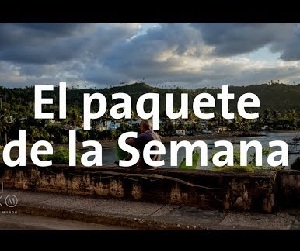
El dilema social asks itself , on Netflix and in The Cuban Package
A documentary that Netflix premiered last week can now be found on ElPackage , the off-line download service that operates informally in Cuba. The other side of the United States blockade of the island is the circulation, without customs or copyright payments, of all kinds of series, movies, video games and computer programs that are produced within 90 miles of our territory.
There is no exchange of goods between the two countries, but neither is it possible to control the underground and totally deregulated market for “cultural products” that are packaged on external hard drives and flash drives, or that come directly to us via the Internet. Sometimes for the better and sometimes for the worse. When talking about the US blockade, it is rarely repaired in its looser side: what lets you take almost everything that comes through digital tracks, thanks to what the French philosopher Eric Sadin has called “the silicolonization of the world.” .
Even for Cuba, under siege for too long, wars are not what they used to be. We are facing adversaries who have no territory, no borders, no diplomats, no seat on the Security Council, and no interest to negotiate. Social media multiplies by zero the laws of sovereign states that it suffocates without suffering repercussions. Like an impenetrable layer of latex, that empire mediates between us and is responsible for the polarization, extremism and many other dysfunctions that contemporary society experiences.
This is the subject of the documentary The Social Dilemma , by American director Jeff Orlowski, which is already circulating on the island’s digital mezzanines. Narrated by top developers from Facebook, Twitter, Youtube, Pinterest, and other platforms, who defected from those companies for ethical reasons, it’s the most lucid, succinct, and deeply terrifying analysis of the impact of so-called social media that I’ve ever seen.
It is surprising, because it is the brains of these platforms that speak up to their elbows of the destructive capacity of these companies, but not because we were no longer aware of it. We Cubans are experiencing it firsthand in two ways: the polarization and derision that permeates social networks, permeable to Trumpian measles from coordinated groups of Cubans living in Miami, and the conspiracy theories that flood Latino communities in Florida. Both Democrats and Republicans compete there for the medal for the most anti-communist party and for denigrating the symbols of the Cuban Revolution, on the eve of an election in which lies have reached a savage dimension, according to the digital newspaper Politico .
Disinformation, Politico adds , reaches “a saturation level that threatens to shape the outcome in the most disputed state in the country” in the current electoral contest. “I’ve never seen this level of misinformation, conspiracy theories and lies,” says Evelyn Pérez-Verdia, a Democratic digital strategist, who has studied WhatsApp groups.
The misinformation that is shared in chats and on YouTube, Twitter, Instagram and Facebook goes beyond hyperbolic rhetoric. Conspiracy theories, especially around QAnon, who posits that Trump is fighting a global power of satanic pedophiles, jump from the networks to the posters and t-shirts of Trump supporters that every week mobilize in Florida.
Last Friday, the main Spanish-language newspaper in that state, El Nuevo Herald , was forced to withdraw its supplement “Libre”, which attacked the Black Lives Matter movement with racist and anti-Semitic opinions. A poisonous youtuber, self-proclaimed leader of the People’s Party in Miami and Trump’s main spokesman in the Cuban-American community, has announced, among other succulent lies, that a wave of immigration from the island will ensue before November 3. Their live broadcasts usually have thousands of enthusiastic viewers daily.
In an article in which it warns that the Trump 2020 campaign is preparing to invest a billion dollars for Internet advertisements, The Atlantic magazine acknowledges that a vast coalition of partisan media, external political groups, has been mobilized in these elections and private companies, ready to “undertake what could be the most extensive disinformation campaign in history. Whether or not he succeeds in the reelection of the President, the destruction he will leave behind will be irreparable, and not just for the United States. ”
How did we get here? When and who unleashed the demons that are now on the loose? What are we going to do? Those are the main questions that El dilema social asks itself , on Netflix and in The Cuban Package . It remains to be seen whether the dust that the documentary has raised will help de-silicolonization. Hopefully.
(By Rosa Miriam Elizalde/Taken from La Jornada)